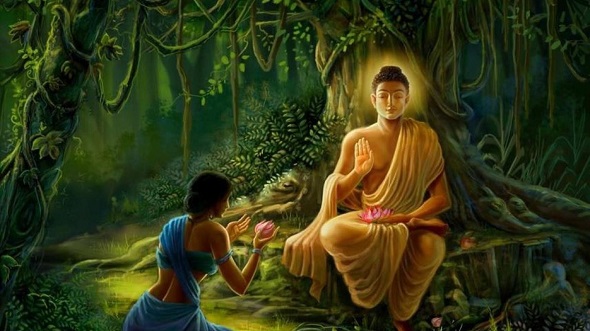Whenever I hear the song, ‘Ammawarune Ammawarune Samma Sambudu Ammawarune’ composed by Mr. Dharmasiri Gamage and sung by Nanda Malini; a Jataka story which my mother told me comes to my mind. It was about how the ‘Bodhisattva’ took his mother on to his shoulders and swam to safety when their ship wrecked amidst a storm. At that moment the ‘Bodhisattva’s mother wished “May you reach enlightenment” with her whole heart. I think, when the Buddha said the phrase, “Mother the Buddha at home” (‘Gedara Budun’), it was to pay gratitude to his mother for granting such a blessing on him.
I don’t know if women are held in such a high regard in any other religion other than Buddhism. In ‘Budusiritha’ [the life story of the Buddha] and ‘Budusamaya’ [the contemporary society in which the Buddha was living] women are mentioned with immense adoration. Think about how humble the Buddha was to spend a ‘vassa’ in heavens in order to preach ‘Abhidhamma’ to his mother. I have heard that the Buddha was in attendance of the cremation procession and followed the procession of his step-mother such that to show his respect towards her. Is this occurrence not enough to quantify the Buddha’s admiration towards motherhood?
Princess ‘Yaśodharā’ who birthed prince ‘Rāhula’, was properly respected and adored by the Buddha. ‘Yaśodharā’ was determined that “If the Buddha really loves me, he would come and meet me at my chamber.” Thus, the Buddha went into her room to see her. He acknowledged his colleagues not to try to distant ‘Yaśodharā’ when she tried to awe him. Later, when ‘Yaśodharā’ became a Bhikkhuni she went to the Budda to take permission for ‘parinibbāna’; Buddha advised her “‘Yaśodharā’, before you end your journey perform a miracle to be commended by your devotees’’. This incident proves that the Buddha wanted to set a positive intention in people’s mind about women and their abilities.
It is a fact that women that lived in the same time as the Buddha, knew that he was a Youngman who was holy in an extraordinary way. Princess ‘Yaśodharā’ Didn’t consider neither her brother’s opposition nor what the Prince Siddhartha’s nakshatra said about the prince leaving his son and wife one day in the future and choosing a monastic life. Even after knowing all those things Princess ‘Yaśodharā’ insisted on marrying prince Siddhartha; she said she would never marry anyone else. It was because she knew how holy he was. One day, when prince Siddhartha was going to the garden, a young woman named ‘Kisa Gotami’ sang a song named ‘Nibbuta Pada’. The song said; “Happy indeed is the mother, Happy indeed is the father, Happy indeed is the wife, who is a lord so glorious”. Prince Siddhartha who was pleased by this song, sent her one of his pearled jewelries as a gift.
The ‘Bodhisattva’ [before the enlightenment] was offered the last meal in his monastic life by a woman when he came to Bodh Gaya. ‘Sujātā’, was a farmer’s wife, who is said to have fed Gautama Buddha a bowl of ‘kheer’, a milk-rice pudding. She also wished that the Buddha’s wish may be granted just like her wish of having a child was granted. The Buddha’s wish was granted the same night proving that a woman’s wholehearted wish will always come true. The Buddha reached enlightenment the next dawn owing to ‘Sujātā’s blessings and his mother’s blessing that was given a long time ago. Is it not a miracle how this gift provided him enough strength to cultivate forty-nine days?
It is said in the ‘Parinibbāna Sutta’ that just as the Buddha attained enlightenment, the ‘māra’ came to him in a friendly way and mocked the Buddha by saying “Now that you have attained the enlightenment, you may attain ‘pairinibbāna” without suffering in the life. Buddha replied saying “It is true that I’ve attained enlightenment but there are many things that should be done by me. It is my responsibility to form a set of learned disciples who live according to my dhamma while preaching others, defending the truth of this philosophy and establish the four sects, ‘bhikkhu’, ‘bhikkhuni’, ‘upasaka’ and ‘upasika’. After that I will attain parinibbāna”. This proves that the Buddha wanted a 50% of his followers to be women. Therefore, as women we should keep it in our minds that we have an equal right in Sasana just as men do.
Since the time of the Buddha, women did not forget that it is their responsibility to uplift and take care of the ‘sāsana’. There were many other women like ‘Sujatha’, ‘Vishaka’, ‘Sumana’ and ‘Chandrapadupa’ who humbly helped the Buddha. Even though women had to face disparities since the old times because of some men with a patriarch mentality, they never forgot their duties and responsibilities. When allowing women to be ordinated, the Buddha hesitated because of this patriarchy that was throning in the Bharat during that time. The Buddha let women fight and win their own rights. It is chronicled how ‘Mahapajapati Gotami’ and ‘Yaśodharā’ were dedicated to ‘sāsana’. This aim was achievable because of the modesty of the Buddha and Ananda Thero. We were able to protect the women rights in Buddhism amidst all the criticism. As women it is our responsibility to protect those rights together with the blessings and support of men.
© Satipatthana Magazine

